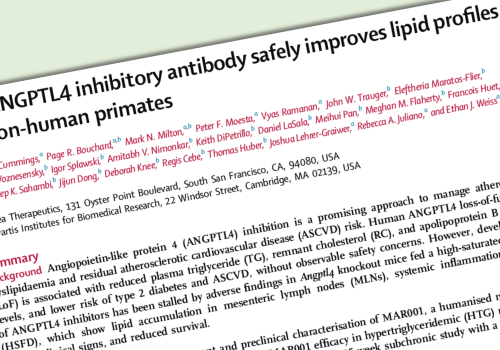
A Phase 2 trial of evinacumab in patients with severe hypertriglyceridaemia and a history of hospitalisation for acute pancreatitis has not met its primary endpoint, but safety data and changes in lipid and lipoprotein levels support further evaluation in larger trials, conclude the study authors in Nature Medicine.
In the trial (NCT03452228), 51 patients with severe hypertriglyceridaemia were randomised 2:1 to intravenous evinacumab 15 mg/kg or placebo every four weeks over a 12-week double-blind treatment period, followed by a 12-week single-blind treatment period. In patients with multifactorial chylomicronaemia syndrome (MCS) without lipoprotein lipase (LPL) mutations (n=19), evinacumab reduced fasting triglycerides (TG) by a mean (s.e.m.) of −27.1% (37.4) (95% confidence interval −71.2 to 84.6) at 12 weeks. However, the log-transformed TG values were not normally distributed and this primary endpoint did not reach the prespecified significance level.
A post hoc analysis was carried out using median reductions in TG values for patients with and without LPL mutations. In LPL-deficient patients with familial chylomicronaemia syndrome (MCS, n=17), median TG reduction in evinacumab and placebo-treated patients was −27.7% vs −22.9% (absolute median change of −753 vs −782 mg/dl; p = 0.9495) respectively. This compared with median reductions of -4.8% vs +9.4% (absolute median change of −675 vs +118 mg/dl; p=0.0076) respectively in 15 patients with MCS and heterozygous loss-of-function LPL pathway mutations. In patients with MCS and no LPL mutations, median TG reductions were -81.7% vs +80.9% (absolute median change of −1,141 vs +805 mg/dl; p=0.0418)
No notable differences in adverse events between evinacumab and placebo treatment groups were seen during the double-blind treatment period.

“In many ways we are encouraged by the results of the study,” says Professor Robert S Rosenson, from Icahn School of Medicine at Mount Sinai, New York, USA. “In patients with no residual lipoprotein lipase activity, we wouldn’t have expected evinacumab to be effective since there is no enzymatic activity present to disinhibit. But in the broader population of severe hypertriglyceridaemia patients, those with multifactorial chylomicronaemia syndrome, it worked profoundly well. Even when the primary endpoints were not met – in familial chylomicronaemia syndrome patients – we observed favourable changes in lipid and lipoprotein levels along with safety benefits that warrant further evaluation of this class of inhibitors in larger trials.”
Reference
Rosenson RS, Gaudet D, Ballantyne CM et al. Evinacumab in severe hypertriglyceridemia with or without lipoprotein lipase pathway mutations: a phase 2 randomized trial. Nat Med. 2023 Mar;29(3):729-737.







